动词不定式例句
动词不定式作表语的例子

动词不定式作表语的例子动词不定式作表语是一种常见的语法结构,它通常用于描述主语的特征或状态。
这种结构中,不定式作为表语,后面跟随一个主语,形成一个复合谓语。
下面是一些动词不定式作表语的例子:1.My goal is to finish the race.(我的目标是完成比赛。
)在这个例子中,“to finish the race”是不定式作表语,描述了“my goal”的特征。
2.She seems to have a new hairstyle.(她似乎有了新的发型。
)在这个例子中,“to have a new hairstyle”是不定式作表语,描述了“she”的状态。
3.He appears to be sleeping.(他似乎在睡觉。
)在这个例子中,“to be sleeping”是不定式作表语,描述了“he”的状态。
4.They are supposed to arrive at 8 o'clock.(他们应该在八点到达。
)在这个例子中,“to arrive at 8 o'clock”是不定式作表语,描述了“they”应该做的事情。
5.She seems to want to go home.(她似乎想回家。
)在这个例子中,“to want to go home”是不定式作表语,描述了“she”的意愿。
6.My wish is to travel the world.(我的愿望是环游世界。
)在这个例子中,“to travel the world”是不定式作表语,描述了“my wish”的愿望。
7.They plan to get married next year.(他们计划明年结婚。
)在这个例子中,“to get married next year”是不定式作表语,描述了“they”的计划。
8.The doctor's job is to save lives.(医生的工作是拯救生命。
动词不定式

用括号内所给动词的适当形式填空。 1. It is important for modern young people _______ to learn (learn) at least two foreign languages. 2. The most important thing for one’s have (have) plenty of exercise. health is to ______ 3. Ted decided _______ to work (work) hard and wanted _____ to go (go) to Beijing University. to get (get) 4. We found it impossible _____ everything ready in time. 5. Sue really doesn’t know which book ________ to choose (choose).
give sb. sth. = give sth. to sb. bring sb. sth. = bring sth. to sb. lend sb. sth. = lend sth. to sb. hand sb. sth. = hand sth. to sb. send sb. sth. = send sth. to sb. show sb. sth. = show sth. to sb. leave sb. sth. = leave sth. to sb. teach sb. sth. = teach sth. to sb. buy sb. sth. = buy sth. for sb. cook sb. sth. = cook sth. for sb. read sb. sth. = read sth. for sb.
动词不定式作结果状语的例句

动词不定式作结果状语的例句在生活中,动词不定式可真是个神奇的东西,像个万能钥匙,能打开各种结果的门。
比如,想象一下你跟朋友约好去吃饭,结果你一到餐厅,他已经点了满桌的菜,你看着那些美味的食物,简直口水直流,心里想:“真是太让人期待了!”这就是“让人期待”这个结果的完美体现,动词不定式“去吃饭”直接导致了这满满一桌子的美味。
再比如,你看到一只可爱的小狗在街上奔跑,心里不禁想:“真想把它带回家啊!”这时候,“想把小狗带回家”这个结果就像一根火柴,点燃了你心中的那份温暖。
小狗的欢快让人瞬间心情大好,结果是你开始幻想着带着它一起去公园遛弯的画面。
再说说学习这回事,很多人一提到学习就想要抓狂,但咱们就是为了“提高自己的英语水平”而不得不奋战到深夜。
那种感觉,像是在攀登一座高山,山顶的美景在前方招手,尽管过程苦,但一想到“终于能流利地跟外国友人聊天”,心中那份成就感简直爆棚。
人们因为工作繁忙而错过了很多乐趣,比如说,想要“享受生活”,结果却是整天埋头苦干。
就像在一场马拉松中,拼命往前冲,但一不小心就错过了路边的风景,没时间停下来看看那朵盛开的花儿,心里有种说不出的遗憾。
再来一则故事,你去超市买菜,心里想着“做一顿丰盛的晚餐”,结果却发现自己买了一堆没用的东西,最后只好将就着做点简单的炒饭。
虽然没有期待中的大餐,但“有饭吃就不错”这个结果倒是让人心满意足。
就算一开始是“做大餐”,最后却以“吃炒饭”收尾,生活就是这么充满惊喜和小确幸。
哦,还有那次旅行,你计划“去海边度假”,结果却因为天气原因被迫“改成去山里爬山”。
虽然有点失落,但在山顶看到的风景瞬间就让人觉得“真值!”那种翻过山头,看到云海的瞬间,所有的遗憾都烟消云散,心里只剩下“这才是我想要的生活”的满足感。
要说动词不定式作结果状语,真是生活中一剂良药,能让我们明白每个选择都可能带来意想不到的结果。
我们不必太纠结,生活中的每个选择,都是通向下一步的桥梁。
想要追求梦想的你,不妨想一想“为了实现梦想而努力”这个结果,尽管过程可能艰辛,但最终能看到的风景绝对值得。
动词不定式作目的状语:

动词不定式作目的状语:动词不定式作目的状语动词不定式是英语中的一种特殊用法,常常用作目的状语来表达动作的目的或意图。
动词不定式作目的状语时通常放在句子中的谓语动词之后,用来回答“为了什么?”的问题。
动词不定式作目的状语的一种常见形式是“to + 动词原形”。
下面是一些示例:1. We study hard to pass the exam.(我们努力研究为了通过考试。
)to pass the exam.(我们努力学习为了通过考试。
)2. He bought a laptop to help him with his work.(他买了一台笔记本电脑为了帮助他的工作。
)to help him with his work.(他买了一台笔记本电脑为了帮助他的工作。
)3. She exercises every day to stay fit.(她每天锻炼为了保持健康。
)to stay fit.(她每天锻炼为了保持健康。
)除了使用不定式的“to”形式外,有时还可以使用动词不定式的“bare infinitive”形式。
下面是一个例子:4. I went to the store to buy some groceries.(我去商店买些杂货。
)to buy some groceries.(我去商店买些杂货。
)动词不定式作目的状语可以用于各种句子类型,包括肯定句、否定句和问句。
下面是一些例子:肯定句:- I study English every day to improve my language skills.to improve my language skills.- She works hard to achieve her career goals.to achieve her career goals.否定句:- He didn't go to the party to avoid crowds.to avoid crowds.- We didn't watch TV last night to save time for studying.to save time for studying.问句:- What did he buy the book for? - He bought the book to learn more about the subject.to learn more about the subject.动词不定式作目的状语的使用丰富了句子的表达方式,可以使句子更加准确和具体。
不定式的六种形式及例句

不定式的六种形式及例句不定式是英语中最具重要意义的复合动词,它可以担当名词、形容词或副词,表示一个动作、状态或认识观念。
不定式可以用下列六种形式来表示:分解不定式: to + 动词原形1. 带 to 的不定式:以 to 开头,后面常跟动词原形,用来表示动作或行为,例如:He decided to go back home. 他决定回家去。
2. 动词不定式:动词不定式是没有 to 的不定式,用来表示动作,例如:He likes having a picnic. 他喜欢野餐。
3. 动名词:动名词的形式就是不定式的动词原形,表示状态或动作,也表示一种习惯的行为,例如:Climbing the mountain is difficult. 爬山很困难。
4. 现在分词:现在分词就是不定式的第三人称单数形式,表示动作,也表示现在的状态,例如:Seeing a movie is a good way to relax.看电影是放松自己的好方法。
5. 过去分词:过去分词就是不定式的完成式,表示一件已发生的动作,也表示状态,例如:Having finished the exam, he felt relieved.考试结束后,他感到如释重负。
6. 同位语从句:同位语从句不定式作表语,指代动作或状态,例如:His plan is to make a trip to France. 他的计划是去法国旅行。
不定式的用法比较复杂,但是它的用法比较常见,在句子中都能看到它的身影。
它不仅表示动作,还能表达一种状态和认识观念,在句子中能够体现精神,是语言表达的一种很有表现力的表达方式。
因此,大家要加强对不定式的学习,并熟练掌握六种形式,以求明确不定式的用法,更好的表达自己的想法和思想。
不定式作主语的用法和例句

不定式作主语的用法和例句在语法中,动词不定式是指动词的一种不带词形变化从而不指示人称、数量、时态的形式。
它之所以被叫做不定式,是因为动词不被限定,或者说不被词形变化所局限。
不定式属于非谓语动词。
以下是小编为大家整理的不定式作主语的用法总结,希望能帮助大家更好地认识不定式,提高英语水平。
1) It's easy (for me) to do that.我做这事太容易了easy,difficult,hard,important,possible, impossible, comfortable, necessary,the first, the next, the last, the best, too much, too little, not enough, better;It's so nice to hear your voice.听到你的声音真高兴。
It's necessary for you to lock the car when you do not use it.当你不用车的时候,锁车是有必要的。
2) It's very kind of you to help us. 他帮助我们,他真好。
Kind, nice, stupid, rude, clever, foolish, thoughtful, thoughtless, brave, considerate(考虑周到的), silly, selfish(自私的)例句:It seemed selfish of him not to give them anything. 他不给他们任何东西,这显得太自私了。
It was silly of us to believe him. 我们真愚蠢,竟然相信了他。
注意:1) 其他系动词如,look,appear等也可用于此句型2) 不定式作为句子成分时,动词用单数形式。
动词不定式的形式例句

动词不定式的形式例句
1. 哎呀,想要知道动词不定式的形式啊,那就像“I want to eat that cake”,这里的“to eat”就是动词不定式呀,我就是想吃那块蛋糕呀!
2. 嘿,你看“ He decided to go shopping”,“to go shopping”就是动词不定式呢,他决定去购物啦!
3. 哇塞,“She hopes to see him again”,这“to see”不就是嘛,她多希望能再见到他呀!
4. 哟呵,“They planned to travel abroad”,“to travel abroad”不就是动词不定式的例子嘛,他们计划去国外旅行呢!
5. 嘿呀,“I need to study harder”,“to study”就是呀,我得更努力学习才行呀!
6. 哇哦,“He tried to solve the problem”,“to solve”就是,他努力去解决那个问题呀!
7. 哎呀呀,“We agreed to meet at the park”,“to meet”就是咯,我们都同意在公园见面呢!
8. 嘿哟,“She offered to help me”,“to help”就是,她主动提出要帮我呀!
9. 哇啦,“They decided to start a new business”,“to start”就是,他们决定开始一项新业务呢!
10. 哎呀妈呀,“I want to be a great writer”,“to be”就是嘛,我好想成为一个伟大的作家呀!
我的观点结论:动词不定式的形式在句子中真的很常见很重要呀,大家一定要好好掌握呀!。
动词不定式的用法大全

动词不定式的用法大全今日一起学习动词不定式的用法大全?快来一起学习吧。
下面我就和大家共享,来观赏一下吧。
动词不定式的用法大全一、动词不定式是什么?简洁来说:to do,非谓语动词形式之一二、位置?须位于被其修饰的名词或代词之后如:Is this the best way to help him?三、作用?具出名词,形容词,和副词的作用四、在句中可做的成分?除了不行做谓语外,其他成分都可以充当如:主语,宾语,定语,表语,宾补,状语(目的,结果,缘由)例句:1.To see is tobelieve.眼见为实/百闻不如一见。
(做主语)2. I wish to be sentto work in the country. (做宾语)3. Can you tell me which is the car to be repaired (做定语)4. My work is to clean the room every day. (做表语)5. He went to the hospital to be examined . (做目的状语)6. I don’t think it rightto do it that way. (做宾补)留意:英语中为了避开头重脚轻(说白了就是平衡句子结构的需要),往往to do一般用it作形式主语(It+be+形容词/名词词组+to do sth/ that)如:To help each other is good. =It is good to help each other .这句话的主语是老师标紫色的字体。
五、不定式的用法1.不定式常可用来修饰人也可以修饰物,表示已经将要发生的动作。
如:(1)He was the first guest to arrive. 他是第一个到达的客人。
(2)He was a brave man to do what he did.他是个勇者才有这样的行为。
动词不定式(语法)
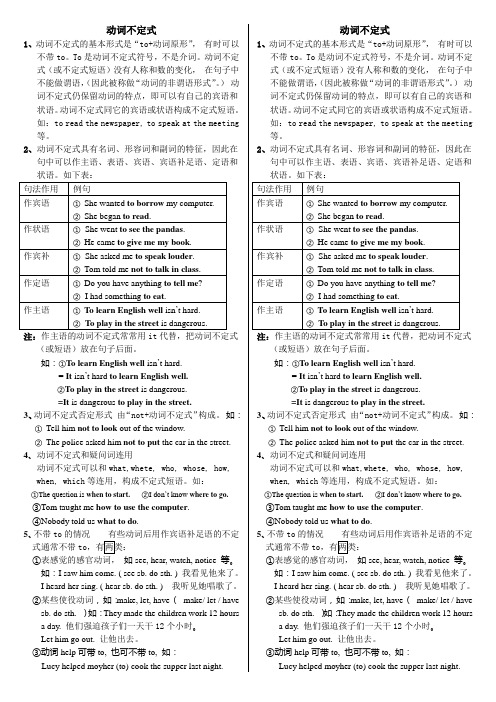
动词不定式1、动词不定式的基本形式是“to+动词原形”, 有时可以不带to 。
To 是动词不定式符号,不是介词。
动词不定式(或不定式短语)没有人称和数的变化, 在句子中不能做谓语,(因此被称做“动词的非谓语形式”。
) 动词不定式仍保留动词的特点,即可以有自己的宾语和状语。
动词不定式同它的宾语或状语构成不定式短语。
如:to read the newspaper, to speak at the meeting 等。
2、动词不定式具有名词、形容词和副词的特征,因此在句中可以作主语、表语、宾语、宾语补足语、定语和注:作主语的动词不定式常常用it 代替,把动词不定式(或短语)放在句子后面。
如:①T o learn English well isn ’t hard.= It isn ’t hard to learn English well.②T o play in the street is dangerous.=It is dangerous to play in the street.3、动词不定式否定形式 由“not+动词不定式”构成。
如: ① Tell him not to look out of the window.② The police asked him not to put the car in the street.4、动词不定式和疑问词连用动词不定式可以和what,whete, who, whose, how,when, which 等连用,构成不定式短语。
如:①The question is when to start. ②I don ’t know where to go.③Tom taught me how to use the computer . ④Nobody told us what to do .5、不带to 的情况 有些动词后用作宾语补足语的不定式通常不带to①表感觉的感官动词, 如see, hear, watch, notice 等。
高中英语语法总结大全之动词不定式
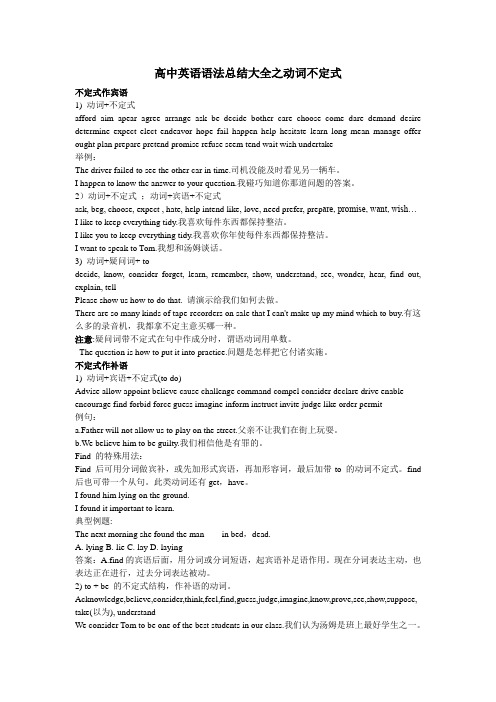
高中英语语法总结大全之动词不定式不定式作宾语1) 动词+不定式afford aim apear agree arrange ask be decide bother care choose come dare demand desire determine expect elect endeavor hope fail happen help hesitate learn long mean manage offer ought plan prepare pretend promise refuse seem tend wait wish undertake举例:The driver failed to see the other car in time.司机没能及时看见另一辆车。
I happen to know the answer to your question.我碰巧知道你那道问题的答案。
2)动词+不定式;动词+宾语+不定式ask, beg, choose, expect , hate, help intend like, love, need prefer, prep are, promise, want, wish…I like to keep everything tidy.我喜欢每件东西都保持整洁。
I like you to keep everything tidy.我喜欢你年使每件东西都保持整洁。
I want to speak to Tom.我想和汤姆谈话。
3) 动词+疑问词+ todecide, know, consider forget, learn, remember, show, understand, see, wonder, hear, find out, explain, tellPlease show us how to do that. 请演示给我们如何去做。
动词不定式作定语的用法总结
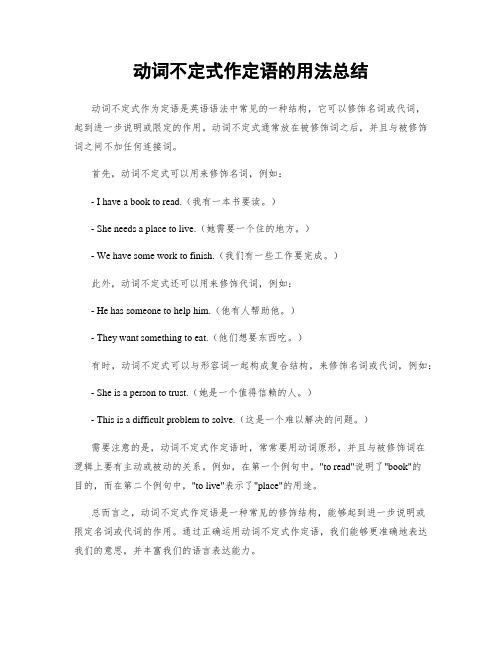
动词不定式作定语的用法总结动词不定式作为定语是英语语法中常见的一种结构,它可以修饰名词或代词,起到进一步说明或限定的作用。
动词不定式通常放在被修饰词之后,并且与被修饰词之间不加任何连接词。
首先,动词不定式可以用来修饰名词,例如:- I have a book to read.(我有一本书要读。
)- She needs a place to live.(她需要一个住的地方。
)- We have some work to finish.(我们有一些工作要完成。
)此外,动词不定式还可以用来修饰代词,例如:- He has someone to help him.(他有人帮助他。
)- They want something to eat.(他们想要东西吃。
)有时,动词不定式可以与形容词一起构成复合结构,来修饰名词或代词,例如:- She is a person to trust.(她是一个值得信赖的人。
)- This is a difficult problem to solve.(这是一个难以解决的问题。
)需要注意的是,动词不定式作定语时,常常要用动词原形,并且与被修饰词在逻辑上要有主动或被动的关系。
例如,在第一个例句中,"to read"说明了"book"的目的,而在第二个例句中,"to live"表示了"place"的用途。
总而言之,动词不定式作定语是一种常见的修饰结构,能够起到进一步说明或限定名词或代词的作用。
通过正确运用动词不定式作定语,我们能够更准确地表达我们的意思,并丰富我们的语言表达能力。
动词不定式

动词不定式动词的非谓语形式有三种:不定式、动名词和分词一、动词不定式:动词不定式是动词的非谓语形式的一种,其形式是to + 动词原形,在句中可作除谓语以外的任何语法成分,即可作主语、宾语、定语、状语、表语和宾语补足语。
▲作主语:1. To obey law is everyone’s duty.遵守法律,人人有责。
2. To know oneself is difficult. 了解自己很难。
3. To do such things is foolish. 做这样的事是愚蠢的。
【注】在现代英语中,常用it作形式主语,把真正作主语的不定式短语放在后面。
4. It’s not easy to learn a foreign language well.要学好一门外语是不容易的。
5. It will not cost you anything to be polite. 礼貌待人并不会损失你什么。
6. It was impossible for him to explain what I meant. 要他把我的意思解释清楚是不可能的。
【注】在感叹句和疑问句中只能用it作形式主语。
例如:7. What harm can it do to give advice? 给人出主意有什么不好的?8. What fun it is to jump into a pool or lake in summer! 在夏天跳进游泳池或湖水里游泳是多么有趣啊!9. How long did it take you to finish the work? 你完成这项工作花了多少时间?▲在这种结构中,如果要表示不定式动作的执行者,要在不定式短语前加上一个for sb. 的短语,语法上称为不定式的复合结构。
例如:10. It is useful for you to learn some spoken English. 学一些英语口语对你来说是有用的。
动词不定式的用法大全

动词不定式的用法大全今天一起学习动词不定式的用法大全?快来一起学习吧。
下面就和大家分享,来欣赏一下吧。
动词不定式的用法大全一、动词不定式是什么?简单来说:to do,非谓语动词形式之一二、位置?须位于被其修饰的名词或代词之后如:Is this the best way to help him?三、作用?具有名词,形容词,和副词的作用四、在句中可做的成分?除了不可做谓语外,其他成分都可以充当如:主语,宾语,定语,表语,宾补,状语(目的,结果,原因)例句:1.To see is tobelieve.眼见为实/百闻不如一见。
(做主语)2. I wish to be sentto work in the country. (做宾语)3. Can you tell me which is the car to be repaired (做定语)4. My work is to clean the room every day. (做表语)5. He went to the hospital to be examined . (做目的状语)6. I don’t think it rightto do it that way. (做宾补)注意:英语中为了避免头重脚轻(说白了就是平衡句子结构的需要),往往to do一般用it作形式主语(It+be+形容词/名词词组+to do sth/ that)如:To help each other is good. =It is good to help each other .这句话的主语是老师标紫色的字体。
五、不定式的用法1.不定式常可用来修饰人也可以修饰物,表示已经将要发生的动作。
如:(1)He was the first guest to arrive. 他是第一个到达的客人。
(2)He was a brave man to do what he did.他是个勇者才有这样的行为。
不定式非谓语动词例句

不定式非谓语动词例句
动词不定式由“to+ 动词原形”构成,如:to study, to play,动词不定式虽然不能作谓语动词用,但仍留着动词的特征,它可以带有所需要的宾语或状语而构成动词不定式短语,非谓语动词作后置定语,由时间状语next month可知所填非谓语动词表示将来的动作,用动词不定式,其逻辑主语是所修饰的名词book,不定式与逻辑主语是被动关系,故用不定式的被动式。
如果动词不定式的逻辑主语为这个不定式所表示的动作的承受者时,不定式一般就用被动语态形式。
【例句】What is to be done next hasn’t been decided yet.
【例句】His first book to be published next month is based on a true story.。
动词不定式
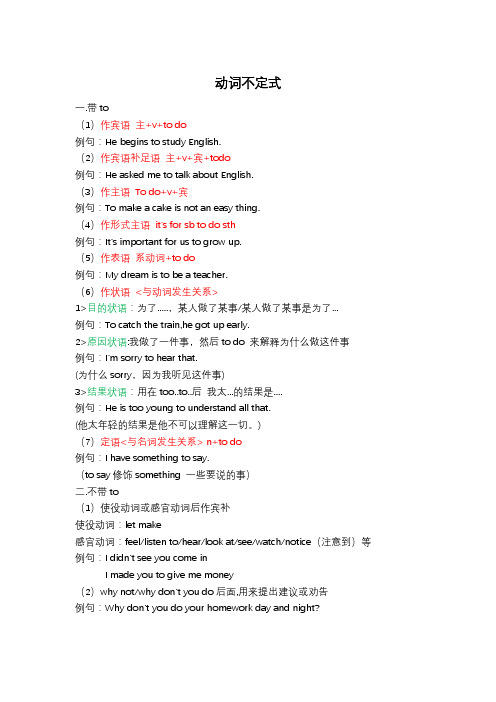
动词不定式一.带to(1)作宾语主+v+to do例句:He begins to study English.(2)作宾语补足语主+v+宾+todo例句:He asked me to talk about English.(3)作主语To do+v+宾例句:To make a cake is not an easy thing.(4)作形式主语it's for sb to do sth例句:It's important for us to grow up.(5)作表语系动词+to do例句:My dream is to be a teacher.(6)作状语<与动词发生关系>1>目的状语:为了.....,某人做了某事/某人做了某事是为了...例句:To catch the train,he got up early.2>原因状语:我做了一件事,然后to do 来解释为什么做这件事例句:I'm sorry to hear that.(为什么sorry,因为我听见这件事)3>结果状语:用在too..to..后我太...的结果是....例句:He is too young to understand all that.(他太年轻的结果是他不可以理解这一切。
)(7)定语<与名词发生关系> n+to do例句:I have something to say.(to say修饰something 一些要说的事)二.不带to(1)使役动词或感官动词后作宾补使役动词:let make感官动词:feel/listen to/hear/look at/see/watch/notice(注意到)等例句:I didn't see you come inI made you to give me money(2)why not/why don't you do后面,用来提出建议或劝告例句:Why don't you do your homework day and night?。
动词不定式做原因状语例句20个
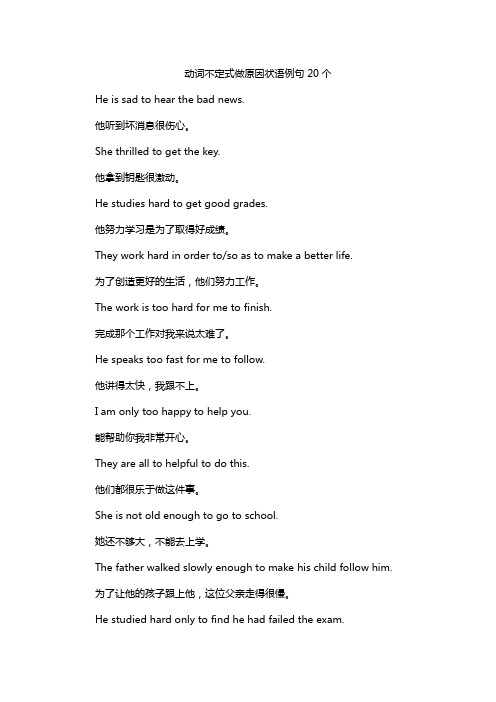
动词不定式做原因状语例句20个He is sad to hear the bad news.他听到坏消息很伤心。
She thrilled to get the key.他拿到钥匙很激动。
He studies hard to get good grades.他努力学习是为了取得好成绩。
They work hard in order to/so as to make a better life.为了创造更好的生活,他们努力工作。
The work is too hard for me to finish.完成那个工作对我来说太难了。
He speaks too fast for me to follow.他讲得太快,我跟不上。
I am only too happy to help you.能帮助你我非常开心。
They are all to helpful to do this.他们都很乐于做这件事。
She is not old enough to go to school.她还不够大,不能去上学。
The father walked slowly enough to make his child follow him. 为了让他的孩子跟上他,这位父亲走得很慢。
He studied hard only to find he had failed the exam.他努力学习,结果却发现考试失败了。
The teacher spoke so slow as to make his students understand him.为了让学生们听懂,这个老师讲的很慢。
He is such a fool as to do the silly things.他就是个傻瓜,才做这样愚蠢的事。
To get there by bike will take us half an hour.骑自行车到那儿将花费我们半个小时。
It's our duty to take good care of the old.照顾老人是我们的责任。
- 1、下载文档前请自行甄别文档内容的完整性,平台不提供额外的编辑、内容补充、找答案等附加服务。
- 2、"仅部分预览"的文档,不可在线预览部分如存在完整性等问题,可反馈申请退款(可完整预览的文档不适用该条件!)。
- 3、如文档侵犯您的权益,请联系客服反馈,我们会尽快为您处理(人工客服工作时间:9:00-18:30)。
非谓语动词——动词不定式
1.He seems to know her address.
2.I hope to see you again
3.She pretended to be listening attentively.
4.Tom appeared to be living in this area.
5.I hope to be earning my living in a year’s time.
6.You are supposed to know how to use a computer=You should know how to use a computer.
7.You are supposed to have been studying=You should have been studying.
8.Students are not supposed to cook in their dormitory=Students shoul not cook in their dormitory.
9.I am sorry to have given you so much trouble.
10.We are leaving at five o’clock in the morning,and hope to have done most of the journey by lunchtime.
11.I regretted not to tell you the truth.
12.I happened to have seen the film.
13.It is very hard to finish the work in ten minutes.
14.It means failure to lose your heart.
15.Her job is to clean the hall.
16.He appears to have caught a cold.
17.I have no choice but to stay here.
18.He did nothing last Sunday but repair his bike.
19.With a lot of work to do,he didn't go to the cinema.
20.He found a good house to live in.
21.The child has nothing to worry about.
22.He has no place to live.
23.This is the best way to work out this problem.
24.He arrived late only to find the train had gone.
25.I visited him only to find him out
26.It's too dark for us to see anything.
27.The question is simple for him to answer.
28.To tell you the truth,I don't like the way he talked.
29.He wished to study medicine and become a doctor.
30.It's necessary for you to lock the car when you do not use it.
31.It was silly of us to believe him.
32.It seemed selfish of him not to give them anything.
33.His dream is to be a doctor.
34.The driver failed to see the other car in time.
35.I happen to know the answer to your question.
36.I like you to keep everything tidy.
37.There are so many kinds of tape-recorders on sale that I can't make up my mind which to buy.
38.The question is how to put it into practice.
39.Father will not allow us to play on the street.
40.I found that to learn English is important.
41.We consider Tom to be one of the best students in our class.
42.We didn't expect there to be so many people there.
43.We regard Tom as our best teacher.
44.So he made some candles to give light
45.He ran so fast as to catch the first bus.
46.I come here only to say good-bye to you.
47.He searched the room only to find nothing.
48.It is good for us to take part in physical labour.
49.It is not hard for one to do a bit of good.
50.To begin with, he had no money, but later he became quite rich.。
